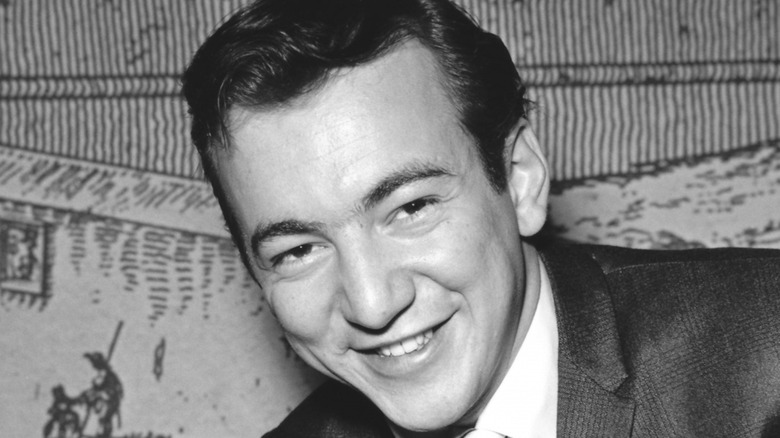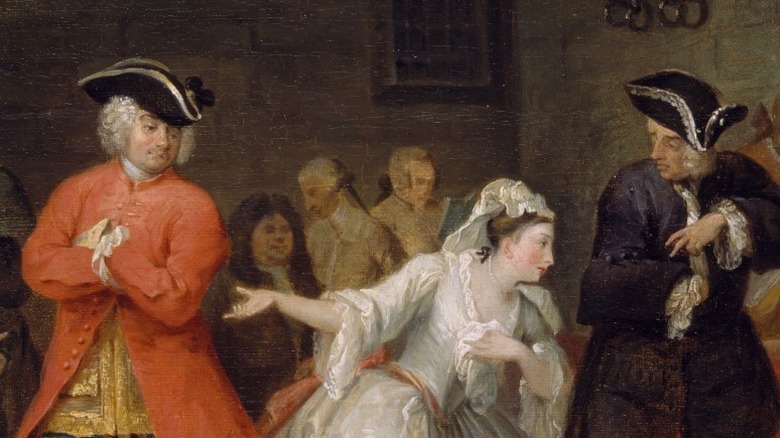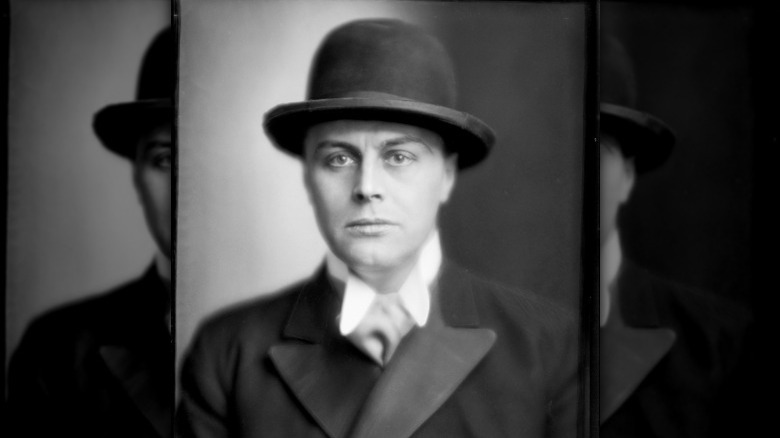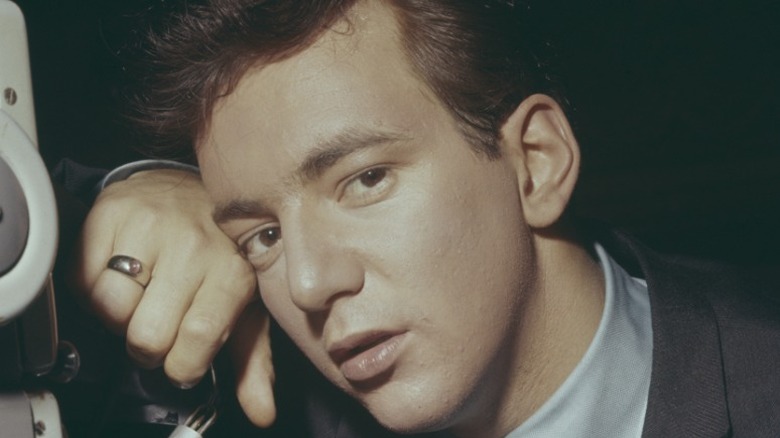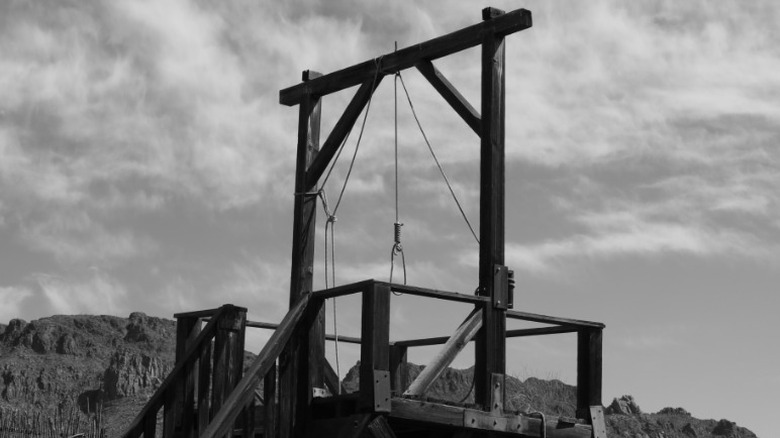The Story Of Captain Macheath, The Inspiration For Bobby Darin's Mack The Knife
The familiar tempo and upbeat lyrics of "Mack the Knife" have rung familiar in the ears of music lovers for generations. Whether it's crooners like Bobby Darin and Frank Sinatra that are belting the notes from your car stereo speakers or the baritone of Louis Armstrong's voice settling over the room like a layer of musical velvet, the song has built fans over the years as no other cover could.
In what has probably been the most iconic version of "Mack the Knife," Darin sings of a dangerous man named Macheath, whom he compares to a shark. As the song goes on, it's revealed that its subject is a vicious killer who carves some of his victims up with a jackknife that he keeps concealed. Macheath also isn't opposed to sending his enemies to sleep with the fishes, either, as the song refers to the villain fitting someone with a pair of concrete shoes and sending them over the side of a tugboat (via Genius).
Some might be surprised to learn that, though Darin did provide some of the lyrics for the song, it was not his original creation. "Mack the Knife" was written nearly 30 years before Darin went into the recording studio with it, and its subject is even older than that. The character Macheath dates back nearly 300 years to an opera written by John Gay and Johann Christoph Pepusch.
Captain Macheath first appeared in an opera
"The Beggar's Opera" was a collaboration between famed British writer John Gay and composer Johann Christoph Pepusch. Gay had penned works of literature prior and many poems before taking a crack at the world of satirical operas (per Britannica). Pepusch had migrated to England from Germany and was serving as music director of Lincoln's Inn Fields Theater when he began collaborating with Gay on the work that they each became most known for (via Britannica).
The opera centers around a notorious highwayman named Macheath, who has been locked away in a prison by a man who seeks to kill him for his money (per Opera Arias). The man who ordered Macheath jailed is named Peachum. Before Macheath was captured, he found out that the highwayman was married to his daughter, Polly. Further complicating matters was the daughter of Macheath's jailer, Lucy. Lucy is also in love with the highwayman and helps him escape by stealing her father's keys and giving them to Macheath.
After Peachum and the jailer discover Macheath's fortune and decide to split it, it's revealed that Macheath has been recaptured and is to hang with the other criminals. At this point, Macheath has been named to be the husband of four different pregnant women. Though the narrator of the tale says that he should probably hang, Macheath is exonerated, and the company celebrates his marriage to Polly.
The opera was meant to poke fun at the royal government, namely the king's chief minister, Robert Walpole.
Macheath makes another appearance in an opera 200 years later
"The Beggar's Opera" grew to be a popular production, with various companies performing it over the years. In its time, it had the longest run of any in the history of Lincoln's Inn Fields Theater, with more than 60 performances (via British Library). It was revived in 1920 in the storied Lyric Theatre, where it ran for nearly 1,500 more shows (per "The Beggar's Opera: A Ballad Opera in Three Acts"). Later in the decade, a German playwright named Bertolt Brecht collaborated with composer Kurt Weill to release an updated version of the opera titled "The Threepenny Opera" (per Britannica). The updated version of Gay's most known work had some different political overtones than the original — Brecht's version was critical of capitalism in the post-industrial era (via Lit Charts).
"The Threepenny Opera" has been adapted for the screen three times: in 1931, 1963, and 1989 under the name "Mack the Knife" (per IMDb). The latter version features Raul Julia as Macheath, Richard Harris as Peachum, and Roger Daltrey as a street singer, who performs the title song during the production.
Mack the Knife was translated in 1954, spawning hit singles
Macheath's character wasn't content to stay the subject of touring operas, however. The song "Mack the Knife" — written and performed for "The Threepenny Opera" — became a fan favorite, performed at the beginning of each performance in German (per Reynolds News). The song was first introduced to American audiences in 1933 when opera was translated into English and performed in the States. This show was a flop, having only a dozen performances before it was forced to close (via Internet Broadway Database).
But the show would not be lost on U.S. audiences forever. In 1954, a newly translated version of the show was released by Marc Blitzstein and began a successful run off-Broadway run (per Internet Broadway Database). It ran for more than 2,500 performances over six years and brought the song "Mack the Knife" into the English language in a way not delivered before.
The hit song from the production was soon recorded by Bobby Darin. The 1959 release of "Mack the Knife" was a smash hit in both the United Kingdom and the United States, topping the charts in each country. And the rest was music history (per Udiscover Music).
Was there a real Captain Macheath?
Though "The Beggar's Opera" was a work of fiction by John Gay, it's believed that the literary great may have borrowed a bit from British history when finding inspiration for the characters in his work. Per Britannica, there are several parallels between protagonist Macheath and a wily English criminal named Jack Sheppard, a legend in his own time whose thievery and daring jailbreaks have been fodder for "plays, romances, and burlesque."
Sheppard was a career petty criminal who was first sent to live behind bars at the St. Giles Roundhouse jail. After escaping this facility, he went on to commit a lot more thievery before being incarcerated a second time. Held in New Prison, Sheppard escaped from his shackles and cut through the bars of his cell before making his way over two prison walls. He was captured again after living as a highwayman and sentenced to death. But he once again let himself out of prison. His escape was partially due to his lady friend Poll (sound familiar?) sneaking him a nail file to cut through his chains and the bars. When he was caught a fourth time, he was remanded to solitary confinement. But he could not be held here, either — Sheppard broke through his chains again and fled the Newgate prison, using his bedsheets to climb from a window.
When he was captured a fifth time, his luck had run out. He was hung at Tyburn on November 16, 1724, in front of a crowd of 200,000 people.
Mack the Knife has been recorded by more artists than you might think
The song "Mack the Knife" might be mostly attributed to either Louis Armstrong or one of the two crooners, Frank Sinatra and Bobby Darin, whose versions are still played in too many Italian restaurants to count. But these three iconic musicians were far from the only ones to record and release a version of the song. Over the years, "Mack the Knife" has become a part of the musical catalog of dozens of recording artists, many of whom put their own unique twist to the lyrics.
The song was covered by another Rat Pack member, Dean Martin, in 1959 and followed up by a version from Ella Fitzgerald in 1960 (per Spinditty). Bill Haley & the Comets released their rendition in 1960, followed by Bing Crosby (per Discogs). There have been many contemporary versions of the song released over the last 30 years, including recordings from The Psychedelic Furs, King Kurt, Dr. John, Jimmy Buffett, and Nick Cave.
The song is now nearly a century old, but versions of it are still popular on satellite radio play. According to Secondhand Songs, "Mack the Knife" is still a popular song among recording artists today, with multiple versions being recorded or performed live by musicians of every imaginable genre nearly every year.
